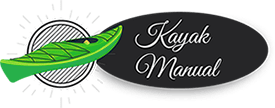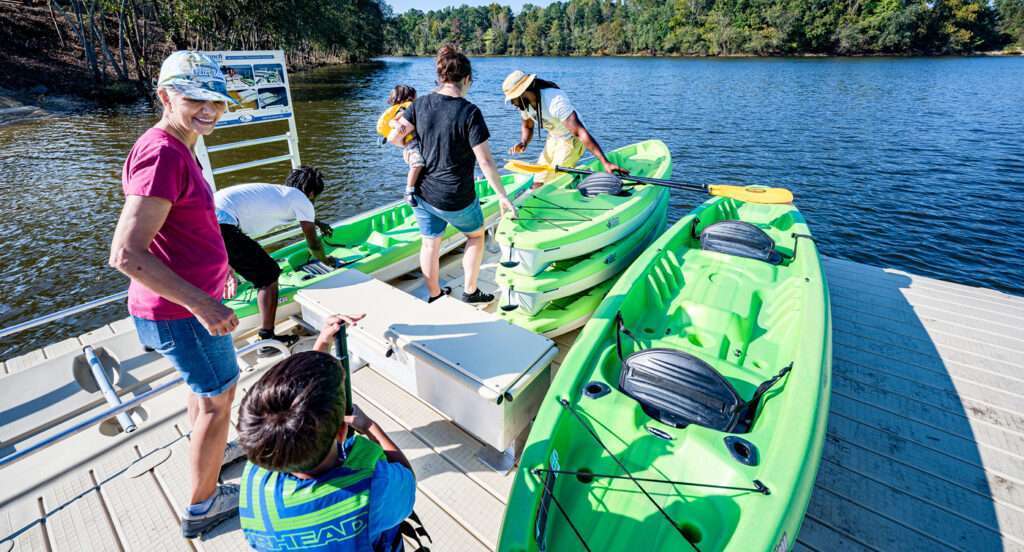The kayak spray skirt goes around the combing of the water craft and keeps excess water from entering the cockpit of the boat, ensuring heat retention, buoyancy and dry comfort for long paddling trips. Spray skirts are made from either waterproof nylon or neoprene, depending on the primary regions paddled in. Making your own spray skirt allows for a custom fit around your body and around the kayak combing. The process requires basic sewing skills and the ability to envision a pattern on a blank piece of fabric.
Things You’ll Need:
- 2 yards of waterproof nylon or neoprene material
- Partner to take measurements
- Non-permanent marker
- Large piece of hard cardboard or one sheet of 1/8 inch plywood
- 10 to 12 large paper clips
- Sewing machine
- Measuring tape
- 6 feet 1/4 inch nylon shock-cord
- Scissors or power saw
- Lighter
- 10 feet 1 inch nylon webbing
- 2 x 3 feet of 1 inch flat nylon webbing
- pull cord fastener
Pattern and Measurements
Step 1
Sit in the kayak at the cockpit and measure the distance from the combing (where the cockpit entrance begins) to your shoulders. Have your partner assist with the measurements. Place the cardboard or plywood over the cockpit and trace the oval of the cockpit onto the cardboard or plywood.
Step 2
Use the scissors to cut out the oval pattern shape from the cardboard. If using plywood, use the power saw to cut out the pattern. Cover the oval pattern with the nylon and draw around the oval, on the nylon, at 3 or 4 inches away from the edge of the oval, making the oval larger. Use the scissors to cut out the nylon pattern. Melt the edges of the nylon fabric by taking the lighter to the edge and running it along the cut edges of the nylon. Visually inspect the edges to ensure no loose strands remain and that the burn has melted the cut edges.
Step 3
Place the nylon shock cord on the outer edge of the nylon cutout. Circle the nylon completely around the edge and extend the nylon another 18 inches from the circumference made. Cut the nylon cord at this point and use the lighter to melt the ends of the cut shock cord.
Step 4
Fold the outer edge of the nylon cutout around the shock cord, and place a paper clip to hold the folded material around the cord every few inches. Starting from the back end of the nylon cutout, sew the folded loop over the shock cord so the cord is nested inside the two layers of nylon. Leave the front end of the nylon shock cord exposed, with 8 to 9 inches on either side. Slide the shock cord fastener over the two ends of exposed cord so they mesh into the unit, closing the circle or cord.
Step 5
Place the shock cord around the cockpit combing and push the fastener up to the combing and pull on the excess nylon to tighten the nylon against the combing. Draw the area where you will be sitting onto the top of the nylon where it is over the cockpit and on the combing. Remove the nylon and cut out the circle where you will enter the cockpit. Melt the edges of the cut with the lighter.
Step 6
Take one of the 3-foot sections of webbing and put it over one shoulder. Repeat with the other 3-foot section on the opposite shoulder. Step through the open hole of the nylon and sit in the kayak with the webbing over the shoulders. Mark where the webbing rests when you sit. Sew the webbing onto the marked areas in the front of the nylon. Take the 10-inch piece of webbing and fold into a loop. Sew the loop to the very front of the nylon, where it meets at the combing, so there is a circle of webbing coming off the front of the nylon/spray skirt.
Step 7
Sew the back ends of the 3-foot webbing pieces to the back opening of the spray skirt, equal distance apart, and directly across from the front sewn attachment points. These are your shoulder straps to keep the spray skirt in place, under your life jacket (PFD).
Step 8
Sit in the kayak and push the shock cord around the under side of the combing, pull the fastener into the combing to tighten the spray skirt and pull out the front webbing loop so it can be seen and reached form the cockpit. Remove the spray skirt by pulling forward with the webbing loop and then up and back.

